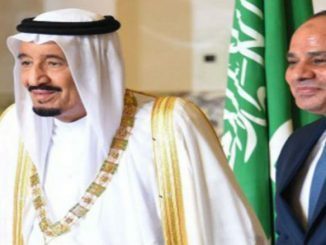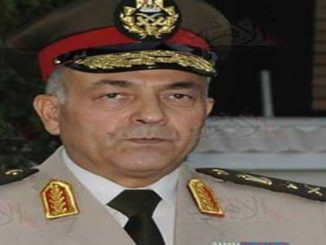
Fayez al-Serraj, the head of Presidency Council (PC), has arrived in Cairo for a series of meetings, the most important of which will be with the president of Tobruk’s House of Representatives (HoR), Aqila Saleh, for discussing the proposed list of members of the UN-backed Government of National Accord (GNA) for the third time, reported Libya Herald.
Al-Serraj is also expected to discuss Libya’s new developments with top Egyptian officials.
The visit comes after the recent political and military developments in Libya, especially after Hafter’s militias -known as Libyan National Army (LNA) and affiliated with Tobruk Government – controlled the Crescent Oil Region.
In addition, Tobruk’s House of Representatives(HoR) has promoted General Khalifa Haftar to Field Marshal through parliamentarians in the east of Libya.
Egypt is a key supporter to Khalifa Haftar. In a previous interview with Sputnik news agency Haftar said revealed that Egypt provides the (LNA) with assistance in data analysis and military training.
In the same context, al-Sisi had said that “There are positive results that can be achieved by supporting the Libyan National Army and these results can be achieved before we assume the responsibility of external intervening.”
Al-Sisi added in the second part of his interview with the Italian daily newspaper La Republica, “If we give arms and support to the Libyan National Army, it can do the job much better than anyone else, better than any external intervention that would risk putting us in a situation that could get out of hand and provoke uncontrollable developments,” he said. He also added that Egypt encourages Tobruk’s parliament -which supports Haftar and the LNA- on approving the government of national unity.
In the same context,Abdel Razek Al-Nazoury, the chief of General Khalifa Haftar’s army revealed in an interview with an Egyptian newspaper that “Haftar granted the Egyptian army easements on Libyan soil and territorial waters without obtaining the approval of any political institution in Libya, including the House of Representatives (HoR).”
With the arms, equipment, and training support of the Egyptian Armed forces and UAE, Haftar took control of oil ports in Libya.
Two years ago, a militia known as Petroleum Facilities Guards controlled by Ibrahim Jadhran, the regional commander of the Petroleum Facilities Guards (PFG),seized the oil ports about two years ago.
Recently Jadhran, who many Libyans see as a blackmailer of many governments, recognized the GNA’s authority in exchange for a large sum of money, and thus was posed to impede Haftar’s expansion toward the Gulf of Sidra.
However, the LNA attack has been largely successful and, as of September 12, Haftar is in control of most of Libya’s oil, having reportedly seized the ports of Ras Lanuf, Es Sidra, and Zueitina. While Jadran and his allies (first of all the GNA’s Minister of Defense Mehdi Bargathi) are preparing to launch a counter-attack, their hold on these installations has been severely compromised by Haftar’s operation.
According to the latest developments that empowered Haftar, it was expected that al-Serraj UN-backed government will try to negotiate with the LNA’s leader to work with the Presidency Council rather than his present policy of constantly opposing it.
According to Libya Herald, Haftar has been invited to meet al-Serraj in Cairo but so far has not responded.
Moreover, sources claim that UN Envoy Martin Kobler will also be in the Egyptian capital on Saturday to give his support to the Al-Serraj-Saleh discussions.
Today, Kobler was in Misrata and met numerous key players from the city including the municipal council, its members of the House of Representatives (HoR) and the head of the State Council, Abdulrahman Sewehli, apparently to ensure their support for the Cairo meetings.
Libya lives in a severe security chaos as a result of the struggle of power between the Islamic militias and other anti-Islamic militias in Benghazi (East) and Tripoli (West). There are two main competing governments in Libya, one in Tobruk, headed by Abdullah al-Thani, that roots out of Tobruk’s House of representatives(HoR) located at al Bayda city in the (East).
The other government roots out of the General National Congress (GNC) based in the capital Tripoli (West) and led by Khalifa al-Gwhaill. Moreover, a third government has joined the struggle of power in Libya which the UN-backed government, known as the Government of National Accord (GNA), led by Fayez al-Serraj.



